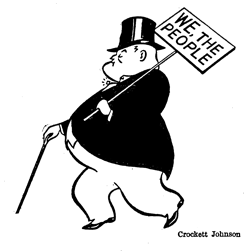Share this
Report Underscores Importance of Blocking New Health Law’s Repeal
Published on Mar 3, 2011 – 7:02:25 AM
By: Health Care for America Now
Washington, DC – The five largest Wall Street-run health insurance companies parlayed the economic meltdown of 2008 and the nation’s subsequent fragile recovery into huge profits in 2010, the last year before market reforms in the AffordableCare Act (ACA) take full effect, according to an analysis by Health Care for America Now (HCAN). The five insurers made combined profits of $11.7 billion by reducing the share of premiums spent on the shrinking membership in private health plans.
Through the recession and its aftermath from 2008 to 2010, combined profits for UnitedHealth Group Inc., WellPoint Inc., Aetna Inc., Cigna Corp. and Humana Inc. increased a breathtaking 51 percent. Last year alone, the five companies’ combined profits grew 17 percent, excluding a one-time $2.2 billion gain from the 2009 sale of a WellPoint subsidiary. On Wall Street, share prices for the five health insurers have risen 15 to 25 percent this year, compared with less than 5 percent for broad market indices.
“While families are struggling to make ends meet and cope with rising health costs in a tough economy, health insurance companies are continuing to make excessive profits,” said HCAN Executive Director Ethan Rome. “The companies made their profits by burdening families and businesses with unaffordable premiums and a bigger share of rising medical costs. The insurance companies’ financial success is the result of a business model that avoids risk and provides less care. While running television ads claiming they care about their customers’ health, the insurers continually devise ways to make more profit by giving inadequate benefits to their shrinking pool of private plan members.”
The health insurance industry’s profits resulted from the following Wall Street-driven trends:
1. Spending on Medical Care Grew More Slowly Than Premiums
In 2010 the five insurers collected $7.7 billion more in premiums than the year before, but growth in spending on patient care lagged behind. Insurers have been free to spend as big a share of premium revenue as they please on bloated CEO pay, marketing, administration, lobbying and a care-denial bureaucracy. Cigna led the industry in finding ways to avoid covering actual health care by shifting medical costs to working families and employers through skimpier coverage and higher deductibles. As a result, the share of premiums Cigna spent on medical care in 2010 (known in industry parlance as the medical-loss ratio) dropped to 80.1% from 83.9% the year before—a decline worth $709 million, according to a congressional report. Aetna also trimmed its health care costs, spending only 82.3% of premiums on patient care, down from 85.2% the year before, a change worth $708 million. UnitedHealth and WellPoint also reported lower spending on care.
2. High Premiums Blocked Consumers from Buying Coverage
In 2010, the companies reduced their private health plan rolls by 839,000 people after shedding 2.7 million in 2009. In two years of economic crisis, the five companies’ private health plans contracted by 3.9 percent, or 3.5 million people, at a time when 50.7 million people already were uninsured. The poor economy, significant job losses and unaffordable health insurance premiums left millions of families to fend for themselves and seek government help or charity from providers to get needed care.
3. Insurers Turned to Medicare, Medicaid Programs for Enrollment Growth
In contrast to the downward private membership trend, since 2008 the five companies enrolled 2.1 million people in privately managed Medicare, Medicaid and military plans—a 15.9 percent increase to 15.6 million.
4. Health Insurance CEOs Pocketed Mammoth Paychecks
For their work rewarding Wall Street in the last decade, the CEOs at the 10 largest for-profit health insurance companies pocketed nearly $1 billion in compensation in the 10 years ending in 2009. As a group they received a 167 percent pay raise in 2009 while average American workers saw wages grow about 2 percent. Compensation figures for 2010 will be reported in the coming weeks.
5. Buybacks Magnified Profits for Insiders, Wall Street Investors
Investors and financial analysts were surprised by how well these strategies and tactics have worked. Things were so good that the insurers used $8.8 billion from soaring customer premiums in 2010 to buy back their own stock, according to the companies. The purpose of share buybacks is to push stock prices up by reducing the supply of shares, a big benefit to insurance company leaders and board members with stakes in their own enterprise. Buybacks do nothing to improve a company’s operations, make the health system run more efficiently or reduce premiums. From 2003 through 2010, the five companies spent $64.1 billion buying back their own shares and lining the pockets of their senior executives while imposing ever-bigger premium increases on America’s families and businesses.
Affordable Care Act Provides New Consumer Protections
In the past,insurance companies have freely used premium revenue to pay for many things other than actual medical care, including excessive CEO pay, lobbying, underwriting (weeding out applicants or charging them higher rates because of their medical history) and administration. Fortunately for middle-class families and employers, 2010 was the last year in which insurance companies will be free to take as much as they please from customer premiums. The Affordable Care Act has new rules requiring insurers to spend on medical services at least 80% of premiums from people who buy coverage on the open market or through small employers. The minimum share for large-business customers is 85% of premiums. Companies that fall short of the minimums must rebate the money to consumers. The Health and Human Services Department estimates that insurers will owe up to 9 million customers as much as $1.4 billion in 2011 rebates payable next year. The law also has new rate-review rules that have already encouraged a growing number of state insurance regulators to resist the kind of double-digit premium hikes that have become common in recent years.
Industry-Backed Republicans Pushing for Repeal
The health insurance industry and other special interests are working with Republican members of Congress and GOP officeholders in the states to roll back the Affordable Care Act and its consumer protections and help health insurance companies preserve their profits. Meanwhile, private groups such as the National Federation of Independent Business have teamed up with Republican governors and attorneys general to pursue litigation challenging the constitutionality of the new health care law.
The Republican Party and its corporate allies are determined to repeal the law and take away dozens of benefits and important consumer protections that are making a real difference in people’s lives right now. They want to take away people’s newly won freedom from fear of insurers denying their care, dropping them when they’re sick and imposing gratuitous double-digit premium hikes. The GOP wants to boot young adults off their parents’ health plans, tell seniors to pay back the $250 donut hole checks they received last year to help buy prescription medications and end the 50% discount on brand-name drugs this year. If the Affordable Care Act is undermined, it will force nearly 900,000 American families a year into bankruptcy because of medical bills and take job-creating tax credits away from small businesses.
“The attacks on the health care law are attacks on America’s working families, seniors and small businesses,” Rome said. “The Republicans want to give our health care back to the insurance companies and put profits over patients. The new health care law eliminates the insurance company’s worst abuses, like denying people care and jacking up their rates at will.”
PDF VERSION: http://www.healthcareforamericanow.org/ins-co-2010-profits
Share this
Contact Us
Have questions? Send us a private message using the form below.


